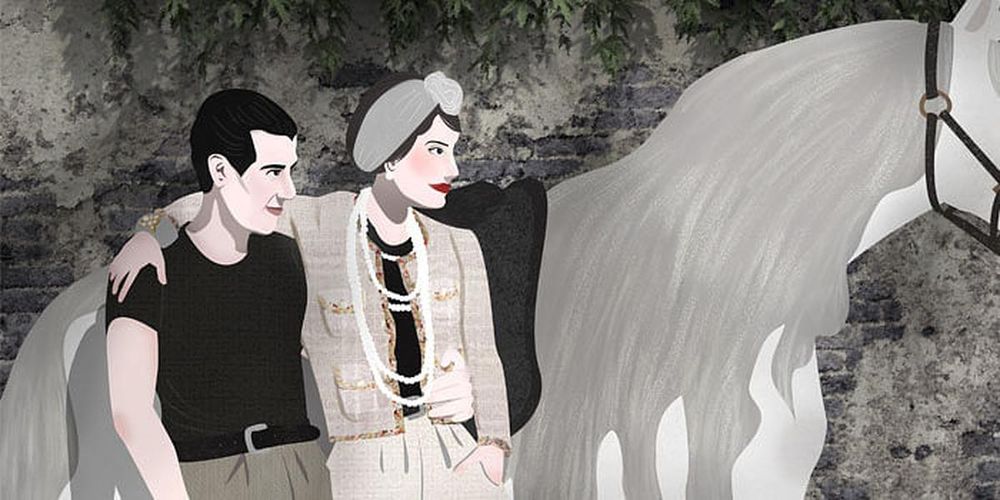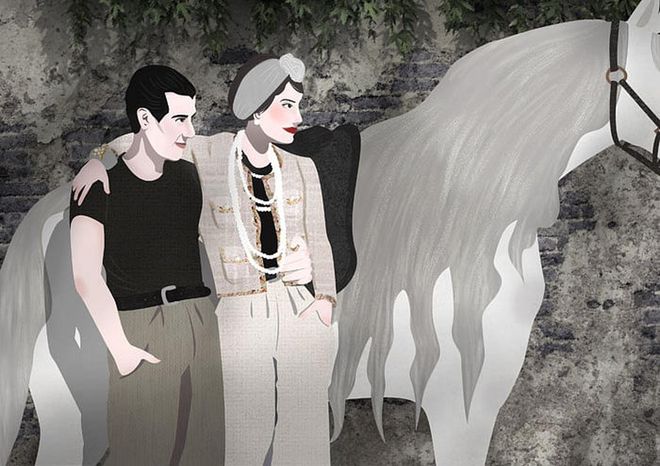Chanel Short Stories: Pantsuit
In the fourth installment in our series of short stories with award-winning writer Amanda Lee Koe, she takes on the iconoclastic Chanel pantsuit


Illustration by 160 Works
chanel
In 2018, the pantsuit might be de rigeur in fashion, but back in the 1900s, Gabrielle Chanel shocked and scandalised the beau monde by dressing herself in men's attire. But daring to buck social convention was what Chanel made her name on, and her spirit is what has turned her House into the icon that it is today. For the fourth installment in our series of short stories with award-winning writer Amanda Lee Koe, she takes on the iconoclastic Chanel pantsuit and reinvigorates the pioneering energy that swept Coco Chanel into the upper echelons of fashion and society.
Inspired by the trailblazing spirit of Gabrielle Chanel, Harper’s BAZAAR Singapore has collaborated exclusively with Lee Koe on a six-part short story series exploring key themes in the fashion icon’s life: her style, her daring, her loves, her friendships, her beauty and her obsession with the mystical. Catch up with all our short stories here.
THE DOOR TO THE FUTURE CITY IS STILL CLOSED TO WOMEN,
Boy Capel wrote publicly,
THE TIME HAS COME TO LIBERATE THEM.
|
|
—Now, let it be said that an educated man could set pen down to paper to craft a
political treatise supporting the emancipation of women, but that did not mean he
would risk wholly his reputation for his lowborn mistress. Boy took you to all the
fashionable palaces of ill-repute, but never the upper-class salons of the haut
monde—
|
Some names weighed more than others. What was your name next to your lover’s?
|
Capel was a heavyweight. Chanel was the sigh of a feather tarrying helplessly to
the ground. Your father had been so bootless, so drunk, he had misspelled his very
own surname in your birth certificate: CHASNEL
|
—The look on the maître d’s face as he drank in your trousers, your riding boots, as
you entered the casino. Heads turned. You were on Boy’s arm, and the maître-d
looked expectantly to the man. You lifted a slender index finger to draw his
attention—
|
THE NAME IS CHANEL,
you said.
I MADE A RESERVATION FOR TWO, UNDER COCO CHANEL.
|
|
Boy had been invited to the casino for a dinner party.
|
Take me with you, you said, but we’ll sit at a separate table from the rest. To your
great surprise, he agreed. You twirled through twenty frocks and stepped out at last
in a tailored pantsuit. All night everyone at the party looked over at your casual
insouciance, at the place card with Boy’s name on it—Arthur Capel—in fine script.
His seat at their table remained empty, his plate, glass, cutlery pristine.
|
Boy’s eyes never left you. He ate and drank his fill with you, as you made
throwaway witticisms, as you cut your filet mignon into thin strips. Out of the
corner of your eye you saw them seeing him looking at you as you raised your glass
to him. He returned the toast, smiling at you.
|
Idleness hangs heavily on you, Coco, he said, for you are far too intelligent.
Whatever shall we do with you?
|
Your love for the man did not blind you. No one should do anything with me, you
thought, you would do everything for yourself.
|
Who was to say: perhaps one day, in a hundred years, the name Chanel would
outlive Capel. He had been born into his name. It was a done deal. You, you were
only beginning to bring yours into being.
|
THE EDUCATION OF WOMEN,
Boy Capel wrote,
TENDS TO TEACH THEM ONLY THE ART OF PLEASING.
|
You went with Boy to his favourite tailor. When you told the tailor you wanted a
riding suit, he measured you out, skirt hem below ankle. You shook your head no.
Not a skirt. You wanted a pantsuit. The tailor could not understand. He remeasured
your hemline for the ankle.
|
—I want you to measure me out for a pair of jodhpurs, you said to the tailor.
Flummoxed, the tailor met your eye. He wanted to know: But who will wear the
pants, M’elle?—
|
If a tailor would not make you pants, you would make the pants yourself. You
would make an art out of the clean line. You would concentrate on the silhouette.
You would make fashion more honest.
|
|
Your archenemy Poiret made dresses that showed the feet. You made suits that
showed the ankles. You put patch-pockets on large tunics. In one photograph,
you’re on a boardwalk in pants, holding court with a famous aviator, your hands
dug confidently into your pockets, a most unladylike gesture.
|
The charms of being a lady became chains when someone else—namely, a man—
had already decided what those charms ought to be. The joys of dressing were
obfuscated when someone else—namely, a man—was hindering your ease of
movement with the ego of his ornamentation. When Poiret bedecked his lady
clients in precious materials, you were convinced he was scorning them.
|
Only another woman designing for a woman would know to give her simplicity,
comfort, neatness. Too much originality in dressmaking meant the finished
products descended to disguise and decoration. That was stage design, not fashion.
The eccentricity should be in the woman, and not the dress.
|
A woman was not a pretext for lace, for sable, for chinchilla.
|
A woman was not a pretext.
|
One day, a woman would step out in well-cut pants, a boucle jacket, two-toned
flats, and run the world.
|
|
You went riding with Boy in your new pantsuit, sitting astride on the finest of his
horses. The jockeys were scandalized. You smiled at them down the line of your
nose as you raced the thoroughbred, meeting Boy at the finish, out of breath, fire in
your eyes.
|
|
REMEMBER THAT YOU’RE A WOMAN, COCO,
Boy said to you. You turned to him, catching your breath:
HOW COULD I FORGET?